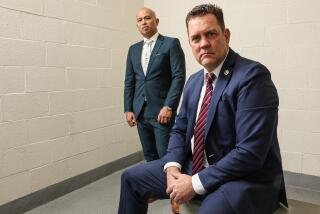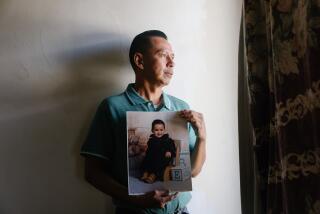Rothenberg Nears Release, His Future Home a Secret
- Share via
He is working on a yard crew in San Luis Obispo, picking up trash, maybe doing a bit of prison landscaping. But after 6 3/4 years behind bars, the man who shocked the country by burning his 6-year-old son nearly to death will be free in nine days.
And not even Charles Rothenberg knows where he is going.
Public outrage over release of the man who permanently disfigured his son in a 1983 Buena Park motel fire has forced officials to keep the location of his future home a secret.
A desert hamlet in November overwhelmingly opposed his parole there, and at least one state senator has received angry letters from constituents protesting his freedom. A Whittier family who said two years ago they would help Rothenberg upon his release now set for Jan. 24 claim they received death threats.
Prison officials now fear a repeat of the 1987 Lawrence Singleton debacle--in which the parolee was virtually driven by furious citizens from Northern California communities because he raped a teen-age girl and axed off her forearms.
So even authorities where Rothenberg is headed will be in the dark until “a day or two” before he arrives from the California Men’s Colony.
“It’s a fact of life that we have to tell a few public officials,” said Tipton C. Kindel, spokesman for the state Department of Corrections, which oversees California’s prisons. “But obviously, based on the Singleton experience, we’re trying to get (Rothenberg) placed without having an entourage of media following him.”
Exactly where Rothenberg will be housed and employed remains undecided, although it might be outside California, corrections officials said Friday.
Ideally, parolees are located near family or friends who can support the felon’s return to civilian life. But Rothenberg’s only surviving relatives--Los Angeles residents--severed ties with him years ago and said recently they want no further contact. Two women have visited and want to marry Rothenberg, an acquaintance claims, but prison officials said romantic involvements have no bearing on parole decisions.
Among the few people who will be told of the arsonist’s whereabouts is his son, David Rothenberg, now 13, and David’s mother and stepfather, Marie and Richard Hafdahl, who live in Orange County.
The story of the jealous father who horribly burned his son trying to hurt the wife who divorced him was the subject of a 1989 television movie, and mounting media coverage of his pending release threaten to make Rothenberg’s a familiar face. His most recent televised interview has been broadcast throughout the world.
So if his return to society is anonymous, Kindel said, it “stands a better chance of working.”
As his release approaches, Rothenberg and prison officials agree it is regrettable.
“The crime was absolutely disgusting to the rest of society and (corrections officials) are not entirely comfortable with him walking free,” Kindel said. “But every effort to keep him in prison was exhausted. We have no choice. Even if he wanted to stay behind bars he couldn’t, unless he violated prison rules. Even then, we couldn’t keep him much longer.”
In a letter last month to the Times, Rothenberg added: “Do I deserve to be set free? No! It’s an unforgiveable act.”
Rothenberg, 49, has spent much of his life behind bars. He had a criminal record before he was 18, although his most serious crime was an attempted armed robbery, for which he was jailed. He was in prison part of the three years he and David’s mother were married, and they were divorced in 1978 while he was serving time for check forgery.
Marie Rothenberg--now Marie Hafdahl--never took David to the prison for visits with his father, thinking the boy could be told when he was old enough to understand. Investigators believe that the two-year separation from his son may have been what prompted him to take David with him when he fled New York--and an arrest warrant charging him with vandalizing the tony Manhattan restaurant where he’d worked as a waiter.
His adoration for David bordered on the obsessive, but Marie never doubted Rothenberg’s love for his son. He doted on David like a mother lion with her cub. He dutifully paid child support, showered his son with gifts and walked him home from grade school most days.
So when he told his ex-wife he wanted to take David on a weeklong vacation to the Catskills, she agreed. Instead, Rothenberg took his son to Orange County, where they checked into a Buena Park motel and planned to visit Disneyland and Knott’s Berry Farm.
It rained most of that week, and David was restless, crying about missing his mother. In an ill-fated phone call to Marie, Rothenberg accidentally hinted of their whereabouts in asking for more time with his boy. Marie angrily opposed the idea and told her ex-husband he would never see his son again once they returned to New York.
That same day, holding his son’s hand, Rothenberg walked to a hardware store, where he bought a jug of kerosene. The next day father and son checked into the Beach Boulevard Travelodge.
In the minutes after midnight that March 3, Rothenberg poured kerosene around David’s bed, kissed his soon goodby and then struck a match at the door. He closed the door and drove across the street, where he watched from a phone booth as flames blew furiously out of the motel.
As he fled to Northern California, his repeated phone calls about his boy’s condition to hospitals and police cast immediate suspicion on him. When he was arrested in San Francisco a week after the fire, he confessed he had tried to kill his son because “If I can’t have him, nobody else can.”
He was convicted of attempted murder, arson and other charges related to the fire, all of which earned him a 13-year prison sentence. It was the maximum permitted by determinant-sentencing laws, which have since been toughened as a result of attempted murders whose victims survive but are forever disfigured.
The work-incentive law allows prisoners a day off their sentence for every day they work or participate in an education program. Rothenberg has largely been a model prisoner although he will have served a total of six years and 10 months behind bars; a few extra weeks were added to his sentence for violating prison rules by having letters personally delivered to David’s stepfather instead of mailing them.
So instead of being paroled last December, he’ll walk free next week.
Wherever Rothenberg goes, officials stress, his actions will be “intensely scrutinized” until his parole ends in three years.
“He will be out of prison,” said Kindel of the Corrections Department, “but he’s not going to be free.”
Numerous conditions on Rothenberg’s parole include reporting regularly to his parole officer, weekly outpatient visits for psychiatric counseling and dogged supervision, Kindel said.
Mother and son have been promised that Rothenberg will not be paroled to Orange County, where they now live with Hafdahl, the Buena Park police officer who supervised the 1983 fire investigation. Rothenberg will be forbidden to make any contact with them and leave the “jurisdiction” to which he will be paroled.
This, however, has been little comfort for the son Rothenberg left scarred from third-degree burns over 90% of his body. Now halfway through eighth grade, David is still troubled by nightmares about his father harming him again.
“He just wants to know when this will all be over,” Dick Hafdahl said of his stepson.
Rothenberg insists that he will not “bother” his son, for whom he professes undying love. At the same time, Rothenberg clings to the hope of one day seeing him again.
Although he declined to be interviewed for this story for fear of jeopardizing his parole and a book deal, Rothenberg responded to questions by mail.
Publication of “A World Without Tears,” a book in which Rothenberg offers his version of the events leading to the now notorious fire, has been delayed. Aimed at helping parents avoid child abuse through awareness, the book dissects the tragedy and features analysis of Rothenberg by a New Jersey psychologist, a minister and Harry Gaynor, director of the National Burn Victim Foundation. Gaynor said the company that was to publish the book disbanded but insists it will be in print soon.
Its proceeds will benefit the nonprofit foundation, but Rothenberg never would have made money off the book anyway because state law bans criminals from profiting from their deeds.
The book, Rothenberg wrote, will assure “that there will never be another David Rothenberg incident, or a father or mother who would cause such pain and suffering to their child, as I have done to my own son.”
The publishers had “arranged a few carefully selected major (television) appearances after I depart” prison, Rothenberg wrote in one of several letters to The Times. “However, I will not flaunt myself around or sign books. This is a project I agreed to do for other parents. The book, hopefully, will touch millions.”
In another letter, he added: “Read it and let it sink in. You as well as millions around the country will be stunned.”
And in another: “The response has been overwhelming. You have no idea how many media people want to see me. . . . Probation, parole, and schools who heard I wanted to help parents (are) wanting this book. It’s been too much.”
“As you know,” he added, “my only purpose was to attempt to ‘reach my son’ all these years.”
He seems lately to have found religion, sending greeting cards to reporters with quotes such as, “Blessed are they who see Christmas through the eyes of a child. Let this be your gift at Christmas, and your families!!”
He talks of overwhelming guilt, and of accepting responsibility for nearly killing his son.
“I cannot tell you or even find the words to explain the pain that is in my heart. . . . I do not ask forgiveness; I cannot forgive myself. Only through Jesus Christ who died for my sins can I live in this world--and I will.”
He has said he received one-on-one psychiatric counseling at his own request and maintains he is “mentally stable.”
In repeated attempts by prison and law enforcement officials to extend Rothenberg’s time behind bars, his mental health has been evaluated by the state, Kindel said. Two of three psychiatrists who have examined him since 1983 found him to be free of mental disorders, Kindel said. A third found him to be “a mentally disordered violent offender” last January and under state law Rothenberg could have been held indefinitely for psychiatric treatment.
But the day after his examination, the state Supreme Court found the law unconstitutional on the ground that it effectively extended an inmate’s sentence after the fact. And a replacement law passed later last year could not be applied to Rothenberg’s case.
Although prison authorities have been circumspect about Rothenberg’s parole destination, they also concede that the inmate’s enjoyment of media attention may ultimately lead him to reveal his whereabouts.
In his most recent letter to The Times, Rothenberg promised to “surface” once he is settled in his new home. “P.S.,” he added, “see Dec. 4th issue of Newsweek, page 6.”
Kindel said this history of frequent correspondence with reporters is precisely why Rothenberg “will be among the last to know” his parole destination. “Then there is less likelihood of him telling somebody.”
Rothenberg, Kindel added, has only lately been realizing the ferocity of public sentiment toward him.
Gaynor, whose foundation stands to gain publicity and potentially thousands of dollars if the book sells, acknowledges his own conflicts about Rothenberg’s release.
“Do we stone him? Do we tie him to a tree and burn him? What do we do?” Gaynor wondered aloud on Friday. “As the book says, my pastor’s first reaction was to shoot him. But he is a human being; he’s a person. So we watch him like a hawk and let him prove himself, his sincerity to do the right thing.”
More to Read
Sign up for Essential California
The most important California stories and recommendations in your inbox every morning.
You may occasionally receive promotional content from the Los Angeles Times.













